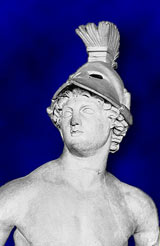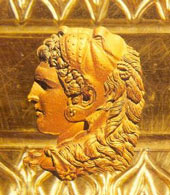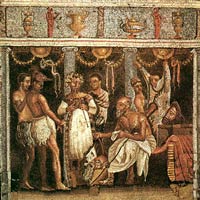|
 View movies about ancient Rome! 
Alexander III, king of Macadonia from 336 until his death in 323 B.C. continues to be the subject of study and debate into the 21st centruy A.D.. Some scholars have devoted their lives to the man who was king, king of kings, and a god in his lifetime. The scarce evidence tantalized and invited speculation and theory. He has been pictured as everything from an alcoholic, homosexual, mass murderer, to the precursor of Christ sent to bring brotherly love to the world. He has been a Christain saint, an Islamic prophet, and a benefactor of the Jews. He remains a folk hero from Sophia to Kabul. To this day his name is invoked for good luck.
For centuries Alexander has been erroneously judged by standards of conduct which have no relationship to 4th century B.C. Macedonian culture. He has been called an alcoholic in a time when consuming amounts of alcohol in excess of current limits is social unacceptable. Among Macedonian warriors it was not.Indeed, the drinking of large amounts of unwatered wine after battle was expected and may even have had a religious connotation. Yet ancient Athenians, Victorians and modern day twelve steppers have stigmatized him for doing exactly what was acceptable at a time and place where strong warriors fought hard and drank hard far into the night. Throughout his life Alexander was scrupulous about behaving in a manner appropriate for a 4th Century B.C. warrior king of Macedonia.
Jewish, Christian, and Moslem scholars have been horrified at tales of Alexander's homosexual affairs. The social stigmatization of homosexual activity is a relatively recent phenomenon. It began in Judaism and was adopted early in the history of The Christian Church and later in Islam. This socio religious taboo was undreamed of in the Macedonia of the 4th century B.C.
Still Christian moralist scholars have spent lifetimes denying to Alexander that which his culture did not.The modern word, "homosexual", has no place in 4th century B.C. Macedonia. It is inapplicable to a culture where bisexuality was extremely common, if not the norm. In the culture of that time and place homosexual, bisexual, and heterosexual are not nouns.People were not grouped by sexual preference.
That Alexander was exclusively homosexual is impossible; he had two wives and a least one, possibly two sons. That he was exclusively heterosexual is unlikely. His father was not, his grandfather was not and he had no reason to be.
|






 View movies about ancient Rome!
View movies about ancient Rome! 